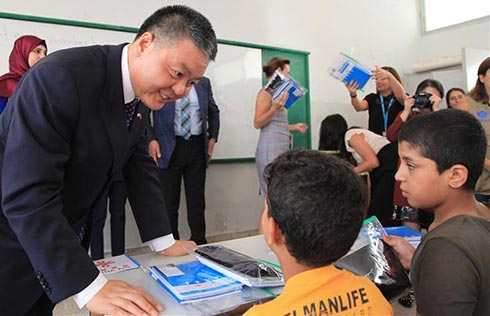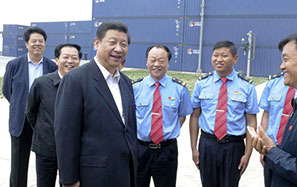Fast train to Europe, boosts development of transport hub
Sichuan province in southwestern China is on the right track to becoming an international transport hub and trade center, relying on its advanced global land and air network.
Chengdu-Europe Express Railway, a direct freight train launched in 2013 connecting western China and Europe, is playing a vital role in boosting bilateral trade between the region and countries involved in the nation's Belt and Road Initiative.
The train starts of from Chengdu with wood, furniture and special local products, and returns from Europe with cars, French wine and Polish beef.
It is the most stable, fast and competitive China-EU train. Also, it is the first one that promises no shutdowns during winter.
By the end of September, the train had shuttled 600 times between destinations with total turnover of import and exports exceeding $2.8 billion.
On Sept 30, the Chengdu-Europe Express Rail expanded to Prague, capital of the Czech Republic. In addition, its range and transportation capacity has been further improved.
The Chengdu-Prague line is the seventh international freight train that starts from Chengdu. It passes through Kazakhstan, Russia, Belarus and Poland, the whole journey almost 10,000 kilometers long. The full trip takes an estimated 13 days to complete.
Sun Lin, deputy general manager of Chengdu International Railway Service, said its development was far from over and the train would extend to Southeast Asia in the future.
A new train running through Vietnam and connecting Southeast Asia is expected to open by the end of the current year. When that happens, Chengdu will be an international transportation junction, connecting Southeast Asia and Europe, Sun added.
Chengdu was a vital point along the ancient Silk Road, which started from the ancient Chinese capital of Chang'an, now Xi'an, and ran through Middle Asia and West Asia and before ending in Rome.
What is less well-known is that most goods traded through the Silk Road were from Sichuan province, such as brocade and silk.
In addition to land transport, Chengdu has opened 182 domestic air routes and 102 international air routes, of which 50 routes are scheduled and non-stop.
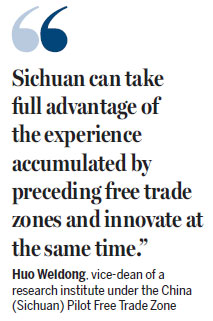
Chengdu will launch more international flights to the United States, Australia, Europe, Africa and Asia, according to the city's latest development plan. The city aims to have a total of 120 international air routes operating by the end of 2022.
One of the city's top international products are the iPads manufactured in Chengdu, which account for 70 percent of the global market.
All these products are transported from the Chengdu Shuangliu International Airport all over the world in 24 hours through Sichuan's global network of air routes.
The new Chengdu Tianfu International Airport is expected to go into into use in 2020. By then, Chengdu will be the third city to have two airports, after Beijing and Shanghai.
More and more goods now are transported from Sichuan to the world quickly and conveniently.
Data shows that in the year to end-August, total volumes of imports and exports of Chengdu and Luzhou - where the China (Sichuan) Pilot Free Trade Zone is located - had surged to 185.5 billion yuan.
That represented year-on-year growth of 69.7 percent and was 13 percentage points higher than the provincial average.
"Sichuan has benefited hugely from the building of the free trade zone," said Han Jian, deputy director of the National Port Administration Office.
Chengdu, Luzhou and Yibin ports have had good results from simplifying declaration procedures, improved information flows, promoting office automation and shortening customs clearance times, Han added.
"Sichuan can take full advantage of the experience accumulated by preceding free trade zones and could innovate at the same time," said Huo Weidong, vice-dean of a research institute under the China (Sichuan) Pilot Free Trade Zone, which is attached to Southwestern University of Finance and Economics.
Some government departments should also further strengthen their awareness of the service, Huo added.
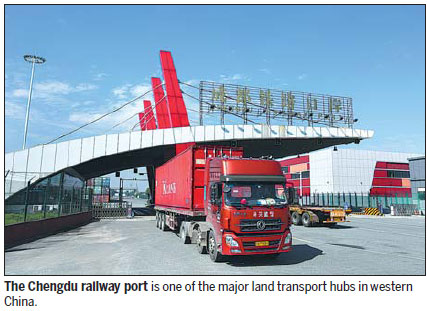
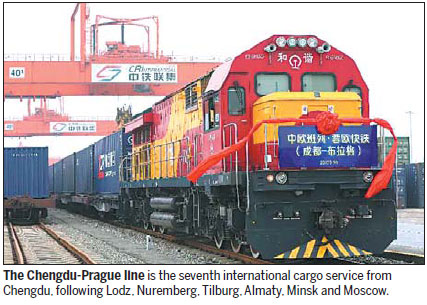
(China Daily 10/19/2017 page17)








